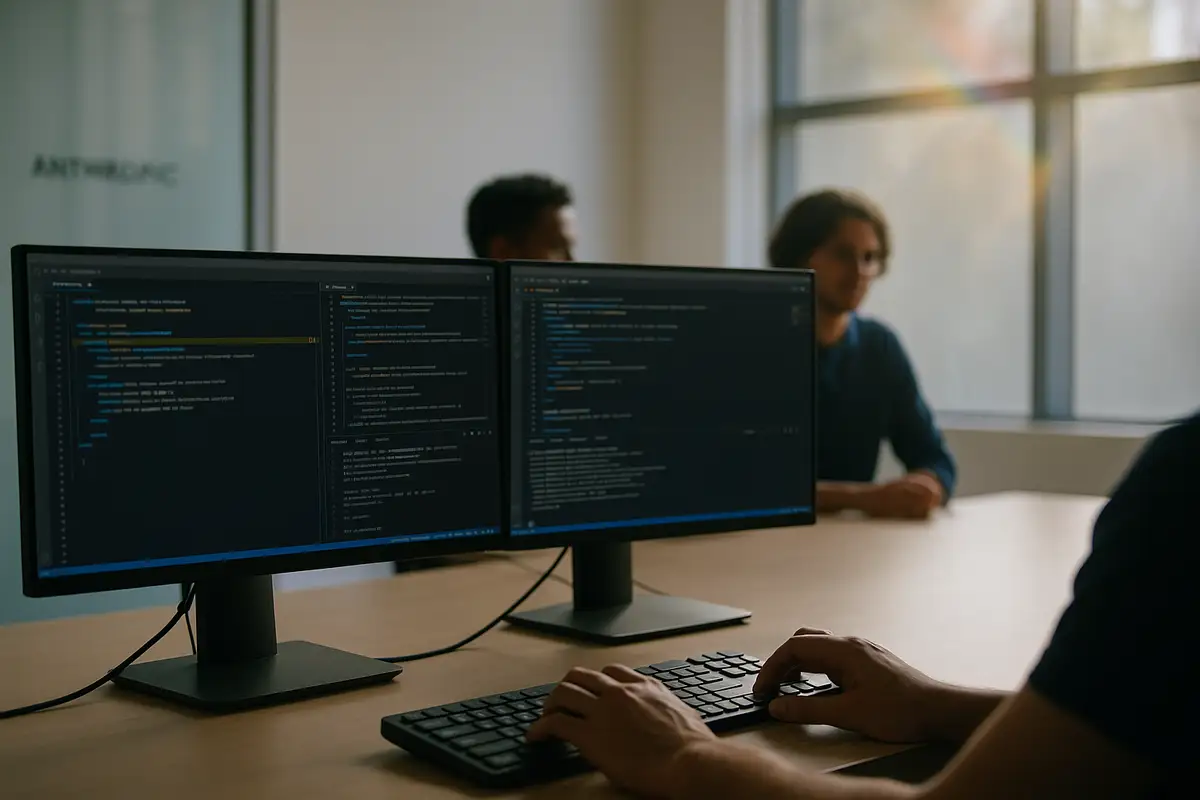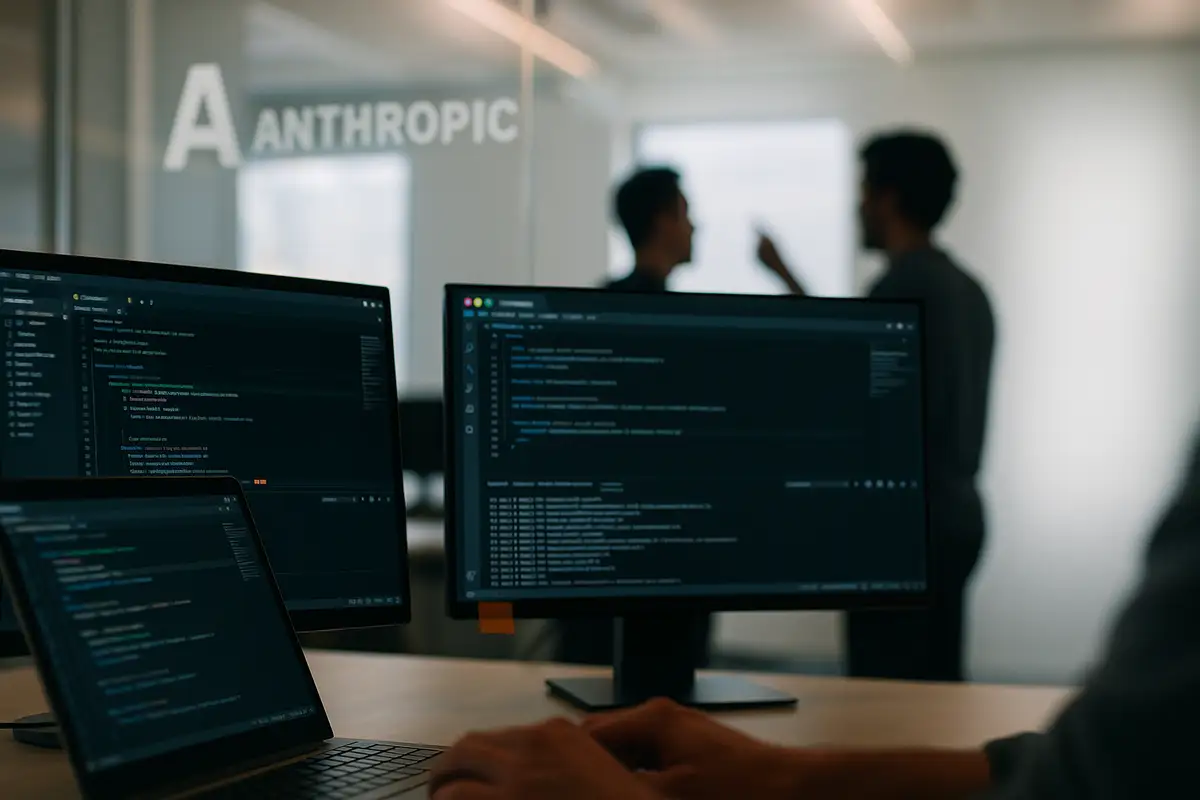Good Morning from San Francisco,
Anthropic shipped their fastest coding model yet—days before OpenAI's developer conference. Coincidences don't exist in AI.
ChatGPT flipped the buy button live Monday. Seven hundred million users can now complete purchases without leaving the chat interface. Merchants gain sales. OpenAI collects transaction fees. Customer relationships? Those migrate to the platform.
Benchmarks jumped this week. Valuations followed. But production tests expose the gap between lab scores and deployed reality. One model blazed through code reviews in two minutes. The same model stumbled on complex debugging. Fast isn't always better.
The real competition moved past models into infrastructure. Checkpoints, SDKs, commerce integrations—whoever controls the tooling captures the ecosystem.
Stay curious,
Marcus Schuler
Anthropic claims coding crown with Sonnet 4.5

Anthropic launched Claude Sonnet 4.5 yesterday, claiming it's the best coding model with 30-hour autonomous runtime—up from seven hours for Opus 4.
The model scored 77.2% on SWE-bench Verified (82% with parallel compute), beating GPT-5's 71.4% and Gemini 2.5 Pro's 69.8%. On OSWorld computer use tests, it leads at 61.4% versus 42.2% four months ago.
The release bundles context editing and memory tools improving agent performance 39%, plus Claude Code checkpoints and the rebranded Claude Agent SDK. Anthropic closed a $13 billion Series F at $183 billion valuation in September, with Claude Code generating $500 million run-rate.
Early tests reveal mixed results—Sonnet 4.5 finished code reviews in two minutes versus GPT-5 Codex's ten, but struggled more on complex bug hunts, exposing the gap between benchmark wins and production deployment.
Why this matters:
• Model releases accelerate while deployment challenges compound—companies solving operational complexity capture enterprise value and justify massive raises at sustainable margins.
• Anthropic's infrastructure investments signal a shift from model competition to ecosystem control, recognizing that training costs require revenue from sticky, production-deployed systems rather than commoditized API access.


AI Image of the Day

Prompt:
A striking high-contrast monochrome portrait captures a confident woman with voluminous, dark-chocolate curly hair cascading around her shoulders. She gazes directly into the camera with a serious, powerful expression, her full lips slightly parted and elegant, brushed silver earrings shimmering in the dim light. Resting her chin delicately on her hand, manicured nails gleam, while she wears a dark, high-neck ribbed sweater that emphasizes the sculpted lines of her neck and collarbone. The background is a deep, velvety black, creating a dramatic chiaroscuro effect that highlights her face and evokes a timeless sense of inner strength and contemplative elegance.
🧰 AI Toolbox
How to Generate Images from Text with AI

Ideogram creates high-quality images from text descriptions. Type what you want to see, and the AI generates detailed visuals in seconds. Great for making logos, illustrations, and designs without graphic design skills.
Tutorial:
Go to the Ideogram website
- Type a description of the image you want to create
- The AI generates multiple image options based on your text
- Choose your preferred style (realistic, artistic, or graphic)
- Download your favorite result or refine your prompt
- Create professional-quality visuals in minutes
- Generate unlimited variations until you get exactly what you need
URL: https://ideogram.ai

Better prompting...
Today: Improve How You Ask Questions
Review my last 10 messages. Find patterns in how I ask questions, blind spots in my reasoning, and habits that limit your answers. Tell me how to ask better questions, structure requests more clearly, and think more broadly.
Claude Code gets checkpoints, VS Code integration

Anthropic shipped Claude Sonnet 4.5 with checkpoints that auto-save code state before each edit, letting developers rewind via Escape twice or /rewind.
A beta VS Code extension brings inline diffs and sidebar visibility, moving Claude Code from terminal-only to IDE-native. The Claude Agent SDK—rebranded from Claude Code SDK—adds subagents for parallel workflows, hooks for automated testing, and background tasks that run without blocking progress.
Context editing plus memory tools improved agent performance 39% in internal tests while reducing token consumption 84% in 100-turn workflows. Early comparisons show Sonnet 4.5 completes code reviews in two minutes versus GPT-5 Codex's ten, though GPT-5 Codex handles complex production debugging more reliably. The pattern: specialization, not dominance.
Why this matters:
• Coding agent competition shifts from model performance to developer tooling infrastructure—enterprises select platforms based on operational polish rather than benchmark scores.
• SDK rebranding signals expansion beyond coding into general-purpose agent development—Anthropic aims to capture usage growth through proprietary infrastructure rather than model superiority alone.

AI & Tech News
Jensen Huang Leverages Celebrity Status for Global AI Deals
NVIDIA CEO Jensen Huang, who had minimal political involvement prior to 2024, is now capitalizing on his rising celebrity status to negotiate artificial intelligence deals across Europe, the Middle East, Japan, and other global markets. Huang is advocating for countries to develop their own "sovereign" AI ecosystems while positioning NVIDIA's technology as the foundation for these independent systems.
OpenAI Revenue Surges to $4.3 Billion in First Half of 2025
OpenAI generated approximately $4.3 billion in revenue during the first six months of 2025, representing a 16% increase over its entire 2024 revenue, according to financial disclosures made to investors. However, the artificial intelligence company also burned through $2.5 billion during the same period, with the majority of expenses attributed to research and development costs as it continues to invest heavily in advancing its AI capabilities.
CoreWeave Secures Massive $14.2B Computing Deal with Meta
CoreWeave has signed a landmark agreement to supply Meta with up to $14.2 billion worth of computing power, marking one of the largest cloud infrastructure deals in the AI sector. The partnership includes access to Nvidia's advanced GB300 chips, highlighting the intense demand for high-performance computing resources as tech giants scale their artificial intelligence operations.
Data Centers Drive Massive Electricity Price Surge Across US Regions
Wholesale electricity prices have skyrocketed by as much as 267% in US areas with significant data center activity compared to 2020 levels, according to new analysis from Bloomberg. The dramatic price increases, driven by surging power demand from data centers supporting AI operations, are being passed directly on to consumers through higher utility bills.
Five percent of companies capture AI value, rest see nothing
Boston Consulting Group found only 5% of firms generate bottom-line value from AI at scale while 60% report no material returns, with top performers already earning 1.7x more revenue growth and 1.6x higher margins. These leaders plan to spend 120% more on AI in 2025 while laggards who lack CEO sponsorship and spread resources across disconnected initiatives fall into what BCG calls a "vicious cycle of losing ground."
Trump Administration Targets Brazil's Popular Digital Payment System
Brazil's homegrown digital payment system Pix, which has achieved remarkable success with adoption by over 80% of the country's citizens through its fast and free service model, has drawn criticism from the Trump administration. US officials argue that the Brazilian government-backed payment platform creates unfair competition that undercuts American financial technology companies operating in the Latin American market.
Google pays Trump $24.5 million for YouTube ban it didn't have to
Google settled with Trump for $24.5 million over his YouTube suspension after January 6, with $22 million going to Trump and a White House ballroom fund, despite courts dismissing the case in 2023. The payment continues a pattern—Meta paid $25 million, X paid $10 million, Paramount paid $16 million—where companies with no legal obligation pay the president to avoid regulatory pressure.
Spotify Founder Daniel Ek to Step Down as CEO in Leadership Transition
Spotify announced that founder and CEO Daniel Ek will transition to Executive Chairman effective January 1, 2026, marking a significant leadership change for the streaming giant. The company will be led by co-CEOs Gustav Söderström, currently Chief Product and Technology Officer, and Alex Norström, the current Chief Business Officer.
One in five Americans now say AI is sentient
A 16-year-old died by suicide after months of chatbot use, leading to the first wrongful death lawsuit against OpenAI, while a survey found 20% of US adults now believe some software is sentient. The case exposes a legal gap: AI systems that form relationships and influence behavior can't be governed as property, but no framework exists for digital personhood.
Nothing Launches AI-Focused App Store and Essential Product Line
Nothing has announced its new "Essential" branding for AI products and launched an Android-based app store called "Playground" that features user-designed, AI-generated applications. The company describes this initiative as the first step toward developing an AI-native operating system for smartphones.
Legal AI Startup Eve Reaches Unicorn Status with $103M Funding Round
Eve, an artificial intelligence assistant designed specifically for plaintiff lawyers, has successfully raised $103 million in funding led by Spark Capital, with participation from Andreessen Horowitz, Lightspeed Venture Partners, and Menlo Ventures, achieving a $1 billion valuation. The legal AI startup has already attracted more than 450 clients and joins the growing number of AI companies reaching unicorn status as the legal industry increasingly adopts artificial intelligence technologies.
FEMA Suffers Major Cybersecurity Breach, Employee Data Compromised
A leaked document reveals that the Federal Emergency Management Agency (FEMA) experienced a "widespread cybersecurity incident" that enabled hackers to steal employee data from both FEMA and U.S. Customs and Border Protection (CBP). The breach was carried out through a vulnerability in Citrix systems, allowing unauthorized access to sensitive personnel information across multiple federal agencies.
Chinese Hacking Group Breaches Foreign Ministers' Email Servers
Cybersecurity firm Unit 42 has identified suspected Chinese hackers operating under the name Phantom Taurus who successfully breached email servers belonging to foreign ministers in what appears to be part of an extensive, multi-year espionage campaign. The cyber intrusion specifically targeted diplomatic communications, highlighting ongoing concerns about state-sponsored hacking groups infiltrating sensitive government correspondence and potentially compromising international diplomatic relations.
Education Software Giant Anthology Files for Bankruptcy
Education software provider Anthology Inc., backed by Veritas Capital, has filed for Chapter 11 bankruptcy protection after debt from its Blackboard merger became unmanageable. The company reported between $1 billion to $10 billion in both assets and liabilities as it seeks court protection to restructure its operations.
EA Gaming Giant Acquired in Largest Buyout Deal
Electronic Arts has been acquired in what's being described as the largest buyout deal, brokered through a partnership between Jared Kushner and Silver Lake co-CEO Egon Durban leveraging Kushner's extensive Saudi Arabian business connections. Sources indicate that Kushner's investment firm will secure approximately 5% ownership of the gaming company as part of the transaction facilitated by Trump's son-in-law's Middle Eastern ties.
Taliban Imposes Complete Internet Blackout Across Afghanistan
The Taliban government has imposed a total internet blackout across Afghanistan, with monitoring organization NetBlocks confirming the complete telecommunications shutdown. A Taliban official has indicated the internet restrictions will remain in place indefinitely, with no timeline provided for restoration of services.
Periodic Labs Poaches 20+ AI Researchers from Tech Giants for Scientific Discovery Mission
Periodic Labs, co-founded by ChatGPT co-creator Liam Fedus, has recruited more than 20 researchers from major AI companies including Meta, OpenAI, and DeepMind to develop artificial intelligence systems for scientific discovery. The startup aims to build AI technology that can accelerate breakthroughs in physics, chemistry, and other scientific fields.
ChatGPT turns checkout counter

OpenAI flipped the buy button live Monday. ChatGPT's 700 million weekly users can now complete purchases without leaving the interface—starting with Etsy, expanding to over a million Shopify merchants next.
Merchants pay OpenAI an undisclosed transaction fee per sale. Shoppers pay nothing extra.
The structural shift runs deeper than convenience. Commerce is migrating from retailer websites into conversational AI, and OpenAI just built the toll booth. Merchants maintain their role as merchant of record but lose direct customer relationships—no website visits, no email captures, no retargeting audiences. "The merchant gets the sale, that's the benefit, but they lose the loyalty," Forrester analyst Emily Pfeiffer notes. Stock markets priced the platform power immediately: Etsy jumped 7.3%, Shopify rose 4.5%.
OpenAI claims products rank by "relevance" but acknowledges checkout integration becomes a ranking factor when comparing identical items—systematic advantage for integrated merchants.
Why this matters:
• Commerce gatekeeping shifts to AI interfaces. Platform access increasingly requires protocol integration, not just product quality—OpenAI, Google, and Visa are racing to control the standards.
• The "agentic" label overpromises current capability. Users still confirm every step manually; true agent autonomy requires legal frameworks and cross-platform infrastructure that don't exist yet.

🚀 AI Profiles: The Companies Defining Tomorrow

Periodic Labs
Two ex-OpenAI and DeepMind researchers quit the AI hype cycle to build robots that discover new materials. They raised $300 million to prove intelligence needs atoms, not just bits.
The Founders
Liam Fedus left OpenAI's ChatGPT team in March 2025. Ekin Doğuş Çubuk brought DeepMind's materials chops—he co-authored the GNoME work that predicted 380,000 stable crystals. They poached 20+ researchers from Meta, OpenAI, and DeepMind. Based in San Francisco with a Menlo Park robotics lab coming online.
The Product
AI scientists paired with autonomous labs. Software proposes experiments. Robots mix compounds, run furnaces, measure results, feed data back. Loop closes. Targets battery materials, catalysts, carbon capture membranes, data center thermals. The moat isn't the model—it's thousands of controlled experiments per week generating proprietary cause-and-effect data that compounds over time.
The Competition
DeepMind already proved the concept with GNoME. Citrine sells materials platforms to enterprise R&D. Orbital Materials ships AI-designed sorbents. Kebotix does self-driving labs. Emerald Cloud Lab operates 200+ automated instruments. Drug discovery startups like Recursion show the pattern works but takes years.
Financing
$300M+ seed led by a16z. $1B pre-money valuation. OpenAI almost led the round but backed out. One of the largest seed rounds ever for a lab that plans to burn cash on furnaces, not just GPUs.
The Future ⭐⭐⭐⭐
Strong founding team. Capital sized for real infrastructure. Clear mission attracts talent. But building labs beats building APIs for difficulty. Supply chains snarl. Robots fail. Some materials won't scale. They need flagship wins in 18 months—materials that beat baselines and survive third-party testing. If they close the loop? The periodic table becomes a revenue table. 💰











